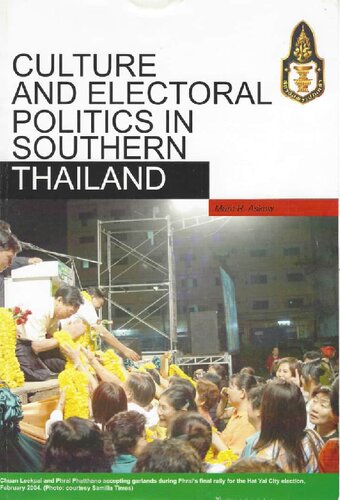

Most ebook files are in PDF format, so you can easily read them using various software such as Foxit Reader or directly on the Google Chrome browser.
Some ebook files are released by publishers in other formats such as .awz, .mobi, .epub, .fb2, etc. You may need to install specific software to read these formats on mobile/PC, such as Calibre.
Please read the tutorial at this link: https://ebookbell.com/faq
We offer FREE conversion to the popular formats you request; however, this may take some time. Therefore, right after payment, please email us, and we will try to provide the service as quickly as possible.
For some exceptional file formats or broken links (if any), please refrain from opening any disputes. Instead, email us first, and we will try to assist within a maximum of 6 hours.
EbookBell Team

0.0
0 reviewsThe King Prajadhipok’s Institute (KPI) is pleased to present the book Culture and Electoral Politics in Southern Thailand: Election campaigning, group formation and the symbolic construction of political allegiances in Songkhla province to all of those who take an interest in Thai politics and democracy. This book is based on KPI’s two-year field research project of the same name, undertaken by Dr. Marc Askew.
Dr. Askew is an associate professor at the School of Social Sciences, Faculty of Arts, Education and Human Development, Victoria University, Melbourne, Australia. His research focuses on the ethnographic and historical study of social space and cultural practice in Southeast Asia, particularly Thailand. He has researched in Thailand for over a decade, undertaking a variety of social research projects both individually and in connection with Chulalongkorn University, the Thai Development Research Institute and the UNDP LIFE program. We are extremely confident that the results of his hard work on our project have produced several useful findings about Thai politics, especially Thai political culture.
In this study, Dr. Askew presents a cultural analysis of political contests in Thailand, explored through a detailed account of national and local-level electoral politics in the regional setting of Songkhla. In addition, he is concerned with investigating the ways that people express their understandings of political contestation and evaluate candidates according to key values. He also explores the modes by which key political actors, their supporters and audiences articulate what is at stake in the electoral arena. As KPI’s a secretary general, I would like to thank Dr. Askew, who made our research project success by providing us with invaluable reports and comments. Readers are most welcome to give us feedback in the form of comments, criticism and suggestions.